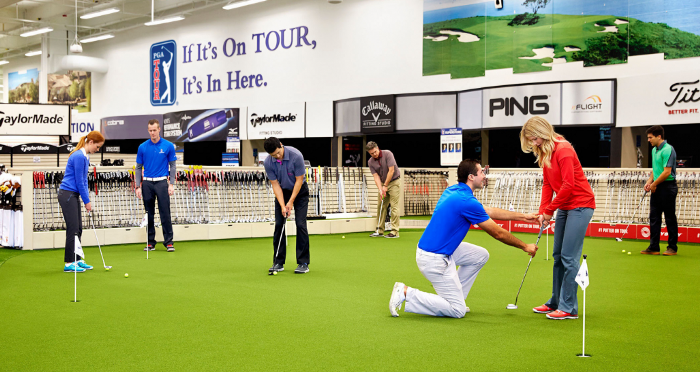No fans were allowed at the 84th Masters at Augusta National Golf Club last weekend, but they had another popular place to get their golf fix.
Interest in golf surges during every major tournament, and the PGA TOUR Superstore meets that demand with a complete experience. They’ll fit you for clubs, they’ll give you lessons, they’ve got hitting bays, and they’ve got a putting green in the middle of the store. They also host manufacturer demo days to demonstrate the latest advances in design and technology.
They use their product to offer an experience that:
-
creates an emotional connection
-
anticipates the world outside of the four walls of the store
-
puts product and merchandise authority at the center and
-
makes the shopper the star of the show.
And they strengthen that emotional connection through sponsorships, giving shoppers the sense that if they buy Dustin Johnson’s clubs, they’ll look like him and feel like part of Team Johnson, even if they can’t swing a club like him.
People are active in the store, and they’re not just buying things — they’re experiencing the merchandise and the culture around it. Like the Rapha Clubhouses we discussed a couple of weeks ago, it’s a place that’s been created where consumers can celebrate and experience their sub-culture — with commerce happening naturally as a result of that experience, not the other way around.
Compare that to an online store or a general sporting goods supplier. In those cases, the retailer is largely just distributing SKUs without offering an experience or an emotional connection. You can sort through the stuff that’s available to find what you need, but the entire burden of the experience is on you.
If I watch the Masters on TV and I think it might be fun to try playing golf, a commoditized store isn’t going to help me — but a store that offers fittings and lessons and hitting bays and a putting green might just give me everything I need.
What’s more, if I buy online, I’m going to order only what I need and move on — but if I head into a store that offers a complete experience, I’ll buy the golf club I came in for, but I might also be inspired to pick up a bag of tees, a shirt and a few other things that help me feel like part of the culture.
No matter what you sell, there’s a key lesson here: if your goal is to get people into your store, you’ll have a much easier time doing so if there’s a culture, an ecosystem or an experience around what you’re offering.
Look for new ways to attract attention to your brand that may not be traditional or expected, and leverage your retail space to bring them to life.

